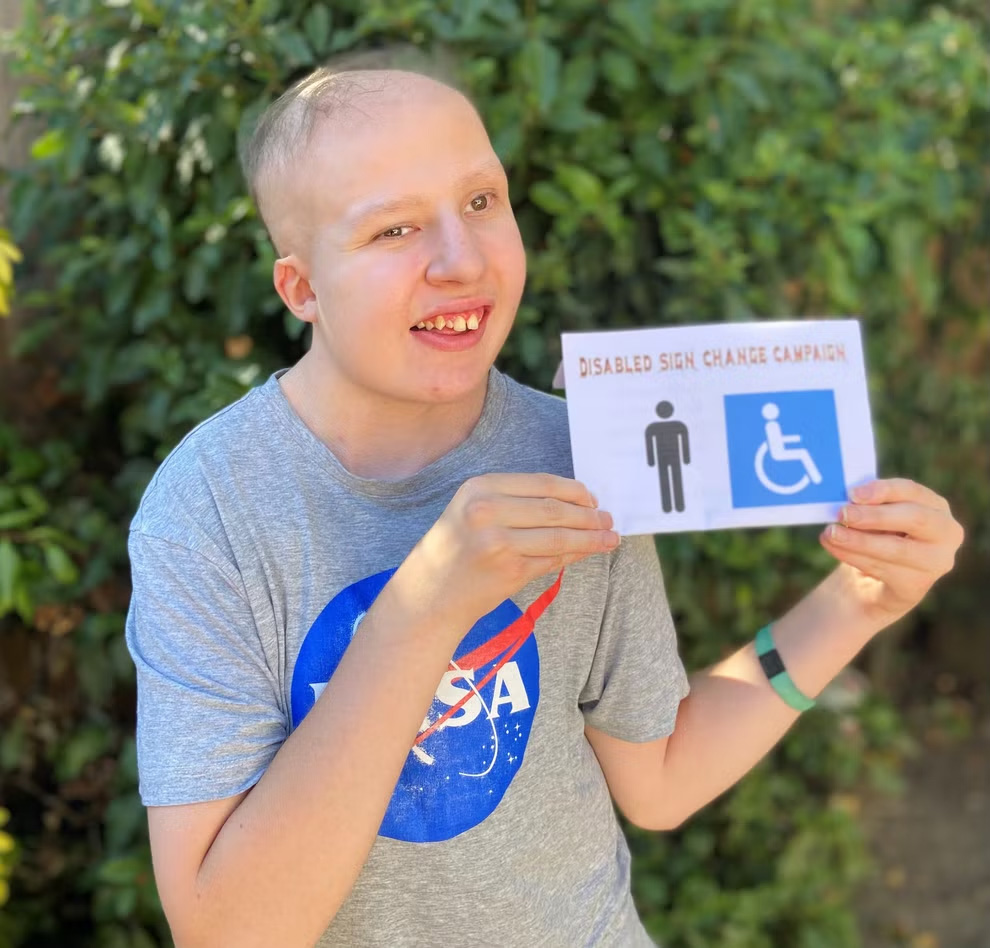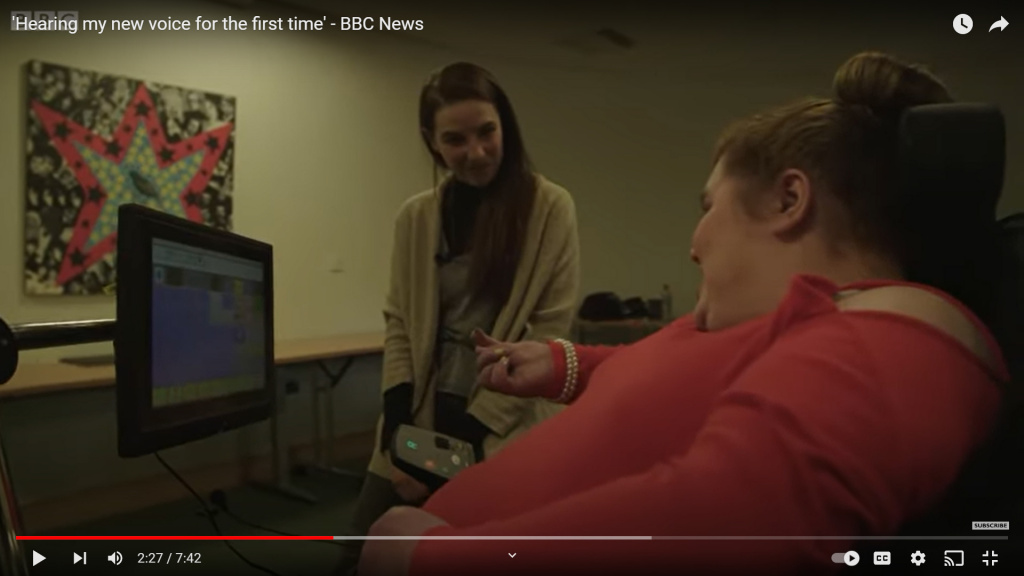
Sam Vestey is a student at National Star College in Gloucestershire. He is currently leading a campaign to change the UK Disabled Badge logo. He believes that the current logo, a symbol of a wheelchair user, should be changed to be more inclusive of people who have non-visible disabilities.
‘Before my Brain Tumour Diagnosis in May 2014, my disability, DiGeorge Syndrome, did not look as visible as it does now. We would get abuse from people who thought I either was not disabled or not disabled enough to have a blue badge,’ said Sam. ‘It happens less now but my parents sometimes still get it when we are parking and people have not seen me. I feel that it is time for a change as the current logo was designed in the 1960s and, in 2019, the government passed new legislation to allow people with hidden disabilities easier access to a badge.’
Sam has already been in touch with Lawrence Robertson, MP and had a meeting over the summer with Alex Chalk MP who were positive about his campaign.
Improving communication
All colleges want to encourage Learner Voice and make their students more independent and able to express their opinions, but it is especially important at National Star College. It offers education, training and personal development for people with profound physical and learning disabilities and acquired brain injuries. A significant number are non-verbal or have challenges making themselves understood.
Learners are assessed for appropriate and effective AAC. This stands for Augmentative and Alternative Communication and covers all forms of technology from switches to Eye Gaze to apps on their phone.
Many of the students live at college with support from care and health professionals and so it is a totally immersive experience as all the staff, 24 hours a day, are committed to getting students to communicate, to express opinions, speak in front of people they do not know and take turns in conversations.
While AAC may help with the physical production of voice, there is another issue. Some young people with propound disabilities can be passive. This is because often they have had intense support in school with staff who do everything they can to build confidence and skills and minimise the possibility of failure. Parents also have been adept at anticipating their child’s needs while providing high levels of care.
Elliot, a former President of the Student Union, described the transition to college, ‘My mum knew when I wanted my bag of crisps and now I have to ask a member of staff, so now I have to think ahead and be responsible for myself.’
Intensive support
Speech therapy is another factor in developing Learner Voice. Sometimes the Speech and Language Therapist (SALT) will come into class every week to work with a student. The teacher will provide the content and materials and the SALT will support the learning, They carry out one to one speech and language therapy, developing the use of the alternative communication in discrete sessions and work with residential staff providing examples and activities to be carried out ‘at home’. It is a well-coordinated approach.
Marianne Sweet, a former journalist, is now PR and Communications Officer for the college and is supporting Sam with his campaign: ‘Some learners want to speak and that’s fine with people who know them well. But our job is to prepare them for life beyond college where they will be talking to strangers. Sam for example has an app on his phone. So sometimes if we’re chatting and he’s tired or distracted, he’ll say something I don’t follow so I ask him to get his phone out so I can understand what he is saying. The video we did for Natspec for his campaign shows him speaking but also using his device.’
Learner Voice Day
Another student, Francesca, led a successful campaign to extend the lunch hour. By the time Francesca had travelled in her wheelchair to the canteen, queued up to get her lunch, found the staff to support her with her personal care and travelled to her next class, she was late and stressed.
Andrew Evans is Learning Programmes Co-ordinator at National Star, and also Learning Voice Co-ordinator for Natspec, a membership organisation for specialist colleges for students with disabilities. He helped Francesca and the Student Union to plan their campaign. They invited the principal to come to the student union to hear Francesca talk to students and gather opinions and examples. The outcome was that students in two of the three pathways amended their timetables to extend lunchtime and give students a proper break.
Once a year Andrew Evans coordinates a Learner Voice Day. This is held in the big sports hall and students spend ideally a month preparing for it. They invite stakeholders, including governors, trustees, management and departmental staff. Staff, students and visitors meet on an equal footing and it is a productive day. ‘I’ve had attendees who I could tell were quite concerned about communicating with our learners because of the various barriers,‘ said Andrew, ‘By the end of the day, they are were confident in conversing with our students.’
However, the point of the day is to hear the learners’ views, and this can throw up some surprises. In the first year, Andrew had student union members running the feedback room, acting as stewards, meeting and greeting students. But for the next event they wanted to be in the room as members of the student cohort and not take an active part in organising the event.
Covid and Learner Voice
Lockdown presented a challenge, especially for residential students. Some students who were classified as being extremely vulnerable opted to stay at the college and staff had to work out how to support them yet keep them safe. There were many discussions about vaccination but also around the contentious issue of masks. One student wrote to a local MP about vaccinations and as a result, National Star was one of the first specialist colleges in the country to get the Covid vaccinations for its students.
Students were canvassed to find out how they felt about working with someone who had not been vaccinated. Some were adamant that they didn’t want a member of staff to do their personal care who had not had a vaccination; others felt that vaccinations were down to personal choice but that staff had to wear a mask.
Voice donors
Most of us are surprised when we hear our voice on a recording, but we know it is ours. Our voice is tied in with our identity. But imagine if your voice is machine produced and does not reflect your ethnicity or background or your age. Off the shelf voices for communication devices are not age appropriate or regional. One student, Jack, had an accident when he was seven which took his voice away. It also took his accent. His family were from the Black Country and his machine voice was in stark contrast to their accents and made him feel even more different.
Students expressed their frustration that there were no age appropriate regional accents. The One Show picked up the story and ran two features, fronted by stand-up comedian Lee Ridley, aka Lost Voice Guy. The publicity led to voice donors for four students. The college’s Find My Voice project also received a grant from The Sun. It is currently working with its tenth student to help them find a voice they want. Students work with their SALT to determine what voice they would like and then choose from a range of selected samples.

Rose Brown was 12 when she was hit by a drunk driver and left unable to walk or talk. She was interviewed by the BBC about creating her own voice. She went through a database of voices and chose one with a Cockney accent, similar to her old voice. The voice belonged to a RADA trained actress Tash Cowley. Tash recorded over 1600 bizarre phrases including, ‘’I’m sorry about your amnesia,’ said the Scarecrow.’ The recordings were sent to a company in America to create Rose’s new voice profile which was then uploaded onto her device at National Star College. See the full story here.
Sam’s campaign
This is ongoing, but he has certainly got his voice heard. Last summer Sam made direct contact with the press: ‘I emailed Sky news about it, and within weeks, they asked if they could interview me to discuss my campaign. I was delighted to be featured on Sky News in August 2022. Following this, the BBC picked up the story and I was then interviewed at college, and this went out on the BBC website and BBC Southwest.’
Sign Sam’s campaign petition https://www.change.org/p/change-the-disabled-badge-to-included-non-visible-disabilities?
Register for free
No Credit Card required
- Register for free
- Free TeachingTimes Report every month